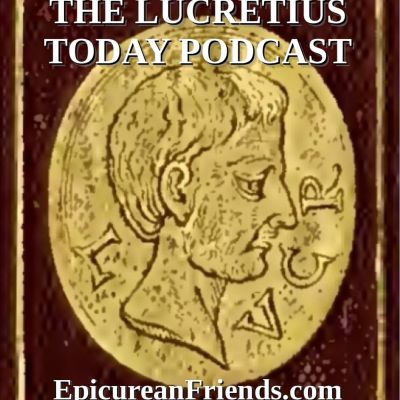Lucretius Today is a podcast dedicated to learning Epicurean philosophy through study of the poet Lucretius, who lived in the age of Julius Caesar and wrote "On The Nature of Things," the only complete presentation of Epicurus' ideas left to us from the ancient world. We'll walk you line by line through the six books of Lucretius' poem, and we'll discuss how Epicurean philosophy can apply to you today. In this podcast we won't be talking about modern political issues. How you apply Epicurus in your own life is entirely up to you. Over at the Epicureanfriends.com web forum, we apply this approach by following a set of ground rules we call "Not Neo-Epicurean, But Epicurean." Epicurean philosophy is not a religion, it''s not Stoicism, it's not Humanism, it's not Libertarianism, it's not Atheism, and it's not Marxism or any other philosophy - it is unique in the history of Western Civilization, and as we explore Lucretius's poem you'll quickly see how that is the case. The home page of this podcast is LucretiusToday...
http://Epicureanfriends.com
Episode 003 - So Great Is The Power of Religion To Inspire Evil Deeds!
The text that will be covered in Episode Three appears beginning at approximately line 81 of the Latin edition of Book One.
1743 Daniel Browne Version: But in these things, I fear, you will suspect you are learning impious rudiments of reason, and entering in a road of wickedness. So, far from this, reflect what sad flagitious deeds Religion has produced. By her inspired, the Grecian chiefs, the first of men, at Aulis, Diana’s altar shamefully defiled with Iphigenia’s blood; her virgin hair a fillet bound, which hung in equal length on either side of her face. She saw her father, covered with sorrow, stand before the altar; for pity to his grief the butchering priests concealed the knife. The city, at the sight, overflowed with tears; the virgin, dumb with fear; fell low upon her knees on the hard Earth; in vain the wretched princess in distress pleaded that she first gave the honored name of Father to the King; but hurried off, and dragged by wicked hands, she, trembling, stood before the altar. Alas! not as a virgin, the solemn forms being duly done, drawn with pleasing force to Hymen’s noble rites, but a chaste maid, just ripe for nuptial joy, falls a sad victim, by a father’s hand, only to beg a kind propitious gale for Grecian ships. Such scenes of villainy Religion could inspire!
Munro Version: This is what I fear herein, lest haply you should fancy that you are entering on unholy grounds of reason and treading the path of sin; whereas on the contrary often and often that very religion has given birth to sinful and unholy deeds. Thus in Aulis the chosen chieftains of the Danai, foremost of men, foully polluted with Iphianassa’s blood the altar of the Trivian maid. Soon as the fillet encircling her maiden tresses shed itself in equal lengths down each cheek, and soon as she saw her father standing sorrowful before the altars and beside him the ministering priests hiding the knife and her countrymen at sight of her shedding tears, speechless in terror she dropped down on her knees and sank to the ground. Nor aught in such a moment could it avail the luckless girl that she had first bestowed the name of father on the king. For lifted up in the hands of the men she was carried shivering to the altars, not after due performance of the customary rites to be escorted by the clear-ringing bridal song, but in the very season of marriage, stainless maid mid the stain of blood, to fall a sad victim by the sacrificing stroke of a father, that thus a happy and prosperous departure might be granted to the fleet. So great the evils to which religion could prompt!
Bailey Version: Herein I have one fear, lest perchance you think that you are starting on the principles of some unholy reasoning, and setting foot upon the path of sin. Nay, but on the other hand, again and again our foe, religion, has given birth to deeds sinful and unholy. Even as at Aulis the chosen chieftains of the Danai, the first of all the host, foully stained with the blood of Iphianassa the altar of the Virgin of the Cross-Roads. For as soon as the band braided about her virgin locks streamed from her either cheek in equal lengths, as soon as she saw her sorrowing sire stand at the altar’s side, and near him the attendants hiding their knives, and her countrymen shedding tears at the sight of her, tongue-tied with terror, sinking on her knees she fell to earth. Nor could it avail the luckless maid at such a time that she first had given the name of father to the king. For seized by men’s hands, all trembling was she led to the altars, not that, when the ancient rite of sacrifice was fulfilled, she might be escorted by the clear cry of ‘Hymen’, but in the very moment of marriage, a pure victim she might foully fall, sorrowing beneath a father’s slaughtering stroke, that a happy and hallowed starting might be granted to the fleet. Such evil deeds could religion prompt.
